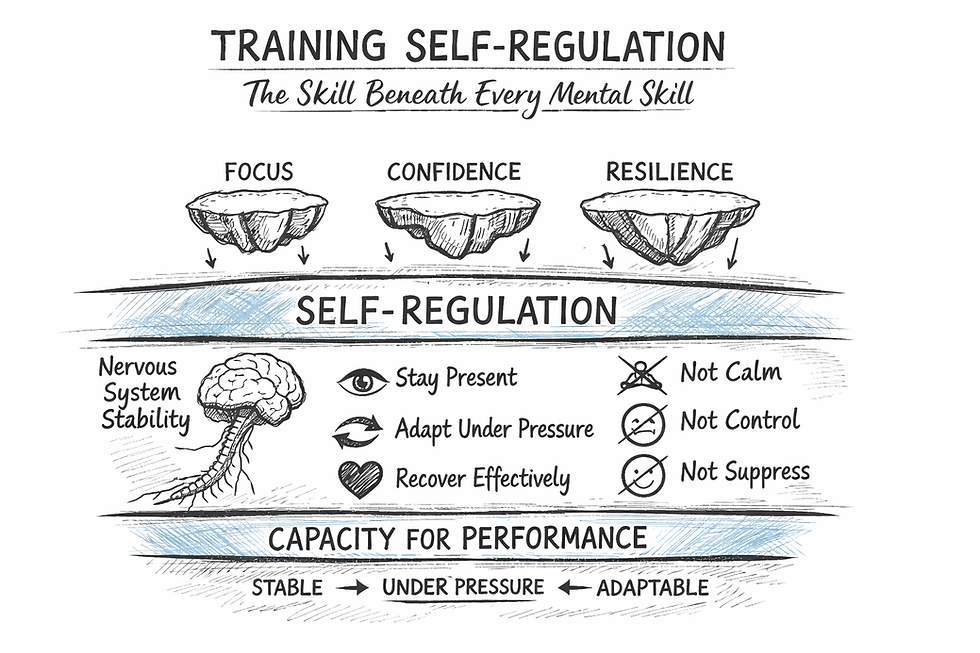Confidence Comes From One Thing: Your Self-Talk
- Kate Allgood
- Aug 28, 2025
- 4 min read
Every athlete wants to feel confident. But here’s the truth that doesn’t get said enough:
Confidence isn’t something you wait around to feel. It’s something you create—through your self-talk.
And your self-talk? That internal voice that shows up in high-pressure moments?It’s shaped by your experiences, your effort, and how you’ve responded when things got hard.
The Link Between Self-Talk and Confidence
Self-talk is the conversation happening in your head—especially when the stakes are high. It’s the voice that says “You’ve got this” or “Don’t mess this up.”And it plays a huge role in how confident you feel when it’s go time.
Here’s the key:Self-talk becomes believable when it’s backed by evidence.
You can’t just tell yourself, “I’m ready” if you know you haven’t shown up consistently. You can’t fake, “I’ve got this” if you’ve never pushed through when it got tough.
But if you’ve done the work—shown up on the hard days, failed and learned, leaned in when it was easier to check out—then your self-talk starts to carry weight.It’s not hype. It’s real.
Confidence Comes From What You've Proved to Yourself
Confidence doesn’t come from compliments. Or hype. Or external validation.It comes from your relationship with yourself—how you talk to yourself in the moments that matter.
And that relationship is forged through challenge.
When you fall short and come back anyway.
When you face fear and go all in.
When you do the unglamorous work that no one sees.
When you stop avoiding discomfort and step toward it.
That’s when the self-talk shifts from wishful thinking to earned belief.

How to Build Better Self-Talk (and Real Confidence)
Here’s how to start shaping self-talk that actually fuels performance:
1. Earn Your Voice
Do the work—especially when it’s hard. Your self-talk gets stronger when it’s rooted in action, not empty affirmations.
2. Reflect on What You’ve Done
Confidence fades when you forget your track record. Regularly reflect on what you’ve overcome, improved, and learned. Build evidence.
3. Reframe in the Moment
Notice when your self-talk slips into doubt or fear. Pause. Reset. Say something grounded and purposeful:“I’ve handled worse.”“This is just the next rep.”“Breathe. Be where your feet are.”
4. Use Challenges as Reps
Every time something doesn’t go your way is an opportunity to train your self-talk. Not everything will go smooth—and that’s the point.
Final Thoughts
Confidence doesn’t just “show up” on game day. It’s built in the small moments—when you choose to stay, to push, to believe.And it’s spoken through your self-talk.
So the next time you're under pressure and that voice in your head starts talking…Ask yourself: Have I done the work to believe what I’m saying?
If the answer is yes—trust it.If the answer is no—start building it today.
Because confidence isn’t magic. It’s a habit. And it starts with how you talk to yourself.
Own your attention. Unlock your potential.
Kate
About: Kate Allgood is educated in the field of applied sport psychology. She holds two Masters degrees in psychology where she graduated with distinction. After a very successful hockey career, she has spent the past 14 years working one on one with high school, college, Olympic, and professional athletes to help them with their mindset, mental performance and mental skills training. Kate has also been a consultant for professional teams, including the Anaheim Ducks primary minor league affiliate the San Diego Gulls, to help the team and players develop their mental game. It is important to note that while Kate has graduate school training in applied sport psychology and general psychology, she does not diagnose or treat clinical disorders, and is not a licensed psychologist.
**The information provided is not to dispense medical advice or prescribe the use of any technique, either directly or indirectly, as a form of treatment for physical, emotional, or medical problems, without the advice of a physician. The information provided is only to offer information of a general nature to help you in your quest for high performance. If you know or suspect you have a health problem, it is recommended you seek your physician's advice.
FAQs: Self-Talk and Confidence in Sport
1. How does self-talk affect an athlete’s confidence? Self-talk directly shapes how athletes think, feel, and perform. Neutral, grounded self-talk reinforces belief, while negative self-talk undermines confidence and focus.
2. Can you train self-talk to improve performance? Yes. Like any skill, self-talk can be trained through repetition, awareness, and reflection. Practicing realistic, empowering inner dialogue helps athletes perform with more clarity and confidence.
3. What if I don’t believe the positive things I say to myself? If your self-talk feels fake, that’s a signal to build more evidence. Confidence grows when your self-talk is backed by real work, past experiences, and how you’ve responded to challenges.
4. Does confidence always mean feeling good? No. Real confidence is the ability to perform well even when you don’t feel perfect. It’s about trusting your preparation and staying focused through discomfort.
5. How can I stop negative self-talk in competition? Start by noticing it—without judgment. Then shift with a simple phrase rooted in truth: “Breathe and commit,” or “I’ve handled this before.” The goal isn’t silence—it’s direction.



Comments